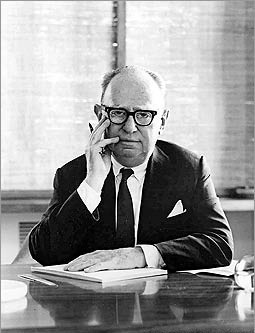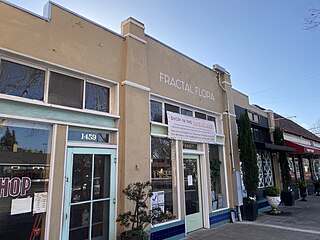
Charlevoix is a city in the U.S. state of Michigan. It is the county seat of Charlevoix County. Part of Northern Michigan, Charlevoix is located on an isthmus between Lake Michigan and Lake Charlevoix, bisected by the short Pine River. Charlevoix serves as the main access point for Beaver Island, the largest island in Lake Michigan, which can be accessed by Island Airways or carferry. The population of Charlevoix was 2,348 at the 2020 census. Charlevoix is mostly surrounded by Charlevoix Township, but the two are administered autonomously.

Leo Burnett was an American advertising executive and the founder of Leo Burnett Company, Inc. He was responsible for creating some of advertising's most well-known characters and campaigns of the 20th century, including Tony the Tiger, the Marlboro Man, the Maytag Repairman, United's "Fly the Friendly Skies", and Allstate's "Good Hands", and for garnering relationships with multinational clients such as McDonald's, Hallmark and Coca-Cola. In 1999, Burnett was named by Time as one of the 100 most influential people of the 20th century.

Kashi is a maker of whole grain cereals and other plant-based foods sourced from regular farming practices. Founded in La Jolla in 1984, the company became a subsidiary of Kellogg's in 2000, and produces about 100 products sold in the U.S. and Canada. Its original cereal, discontinued in 2021, was identified by the tagline "Seven Whole Grains on a Mission". The name "Kashi" is a blended term derived from "kashruth", meaning kosher or pure food, and "Kushi", the last name of the founder of American macrobiotics, Michio Kushi.

Rose Garden, also rendered as Rosegarden, is a historic district of Central San Jose, California, near Downtown San Jose and The Alameda. Rose Garden is a district made up of numerous historic neighborhoods, such as Hanchett Park, primarily characterized by its architecture and numerous cultural institutions, including the San Jose Municipal Rose Garden, Rosicrucian Park, which includes the Rosicrucian Egyptian Museum, and the historic Hoover Theater.
McKenzie Seeds is a seed packaging company founded in Brandon, Manitoba in 1896. Jiffy has moved production outside of Canada with over 70 people working at their location in Brandon. It was established in 1896 by Dr. Albert Edward McKenzie, and claims to supply 60% of Canada's packet seed market.

Beefeater Gin is a brand of gin owned by Pernod Ricard and bottled and distributed in the United Kingdom. Beefeater remained in the control of its founding Burrough family until 1987. The Beefeater distillery is one of 24 in London.

The Charles Copeland Morse House was the home of Charles Copeland Morse, founder of the Ferry-Morse Seed Company. It is located in Santa Clara, California, and is a California Historical Landmark (#904), as well as listed on the National Register of Historic Places.
Charles Copeland Morse (1842–1900) was an American businessman known as the "American Seed King". He co-founded the Ferry-Morse Seed Company, which became the world's leading flower and vegetable seed producer.
Jiffy is a brand of baking mixes marketed by the Chelsea Milling Company in Chelsea, Michigan, that has been producing mixes since 1930. The company was previously named Chelsea Roller Mill. They are known for their products being packaged in a recognizable, small box with the brand's logo in blue. Jiffy was created as the first prepared baking mix in the United States by Mabel White Holmes.
The Scotts Miracle-Gro Company is an American multinational corporation headquartered in Marysville, Ohio, where O.M. Scott began selling lawn seed in 1868. The company manufactures and sells consumer lawn, garden and pest control products, as well as soilless indoor gardening equipment. In the U.S., the company manufactures Scotts, Miracle-Gro and Ortho brands. It also markets and distributes the herbicide Roundup in the U.S. and several international markets including China.

The East Ferry Avenue Historic District is a historic residential district in Midtown Detroit, Michigan. The nationally designated historic district stretches two blocks from Woodward Avenue east to Brush Street; the locally designated historic district includes a third block between Brush and Beaubien. The district includes the separately designated Col. Frank J. Hecker House and the Charles Lang Freer House. It was designated a Michigan State Historic Site in 1976 and listed on the National Register of Historic Places in 1980.

The New Amsterdam Historic District is a historic district located in Detroit, Michigan. Buildings in this district are on or near three sequential east-west streets on the two blocks between Woodward Avenue and Second Avenue. It was listed on the National Register of Historic Places in 2001.

Mother's Cookies is a food brand owned by Italian conglomerate Ferrero Group. Mother Cookies began as a bakery based in Oakland, California, that operated from 1914 to 2008. A sister company, Archway Cookies of Battle Creek, Michigan, was founded in 1936. Both Mother's Cookies and Archway declared bankruptcy in 2008. At its height, the company distributed cookies throughout the United States, and was one of the leading cookie makers in the country. The Kellogg Company acquired the Mother's Cookies trademark and recipes in December 2008 and brought the brand back to West Coast grocery store shelves on May 14, 2009.
Tom Hartle is the founder of CoherentRx, a healthcare technology company that produces Patient Education Genius and other healthcare communication applications.

Dexter Mason Ferry was a businessman from Detroit, Michigan who founded D.M. Ferry & Co., at one time the largest seed company in the world. He is the namesake of Ferry Field at the University of Michigan in Ann Arbor.

Due to its unique geography, being made of two peninsulas surrounded by the Great Lakes, Michigan has depended on many ferries for connections to transport people, vehicles and trade. The most famous modern ferries are those which carry people and goods across the Straits of Mackinac to the car-free Mackinac Island but before the Mackinac Bridge was built, large numbers of ferries carried people and cars between the two peninsulas. Other ferries continue to provide transportation to small islands and across the Detroit River to Canada. Ferries once provided transport to island parks for city dwellers. The state's only national park, Isle Royale cannot be reached by road and is normally accessed by ferry. The largest ferries in Michigan are the car ferries which cross Lake Michigan to Wisconsin. One of these, the SS Badger is one of the last remaining coal steamers on the Great Lakes and serves as a section of US Highway 10 (US 10). The Badger is also the largest ferry in Michigan, capable of carrying 600 passengers and 180 autos.
Renee Shepherd is a gardening entrepreneur and writer known for heirloom seed advocacy and garden-based cooking using home-grown herbs. Better Homes and Gardens called her "a groundbreaking gardener", and Businessweek a "pioneering innovator" who helped popularize specialty vegetables and cottage garden flowers for home gardening and gourmet restaurants.
Gardens Alive!, Inc. is a privately owned multi-title catalog company founded in 1984. It sells garden and lawn supplies, specializing in organic products under its namesake catalog. The company has expanded by aggressively purchasing other catalog companies, including expansion into gift and games after acquiring the assets of defunct catalog company BlueSky Brands in 2008. As of 2010, the company has annual sales of approximately $170 million, 60 percent of which was from garden-related business.
Mabel White Holmes was the inventor of Jiffy baking mixes, and president of the Chelsea Milling Company.
Clyde Huntley Burroughs was a museum director from Vassar, Michigan.











